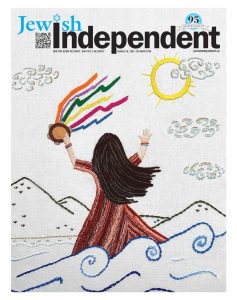After the Israelites escape from Egypt and the Sea of Reeds has returned to its normal flow, with the enslavers either drowned or on the opposite side, Miriam leads the women in singing a song of praise. Apparently, it is the only time in the Torah where women are recorded as seinging their own song.
 They did so with instruments they had brought along with whatever necessities one takes when fleeing a bad situation. The women had such a strong belief that they and their people would be free, that there would be occasions to celebrate with song, music, dance, that they made room among their provisions for instruments.
They did so with instruments they had brought along with whatever necessities one takes when fleeing a bad situation. The women had such a strong belief that they and their people would be free, that there would be occasions to celebrate with song, music, dance, that they made room among their provisions for instruments.
Miriam is older than her brothers Moses and Aaron. “Having been born at the time when the bitter enslavement began, her parents named her ‘Miriam’ (from the Hebrew word meaning ‘bitterness’),” explains an article on chabad.org. However, she was anything but bitter. She was extraordinarily hopeful, continually thinking of the future and how it would be better.
“Miriam was about 6 years old when Pharaoh decreed that all Israelite baby boys be killed,” notes another chabad.org article. “Hearing this, Miriam’s father, Amram, divorced his wife, Yocheved, because he couldn’t bear the possibility of having a son who would be killed. Seeing the actions of Amram, one of the leaders of the generation, all of the other Israelite men followed and divorced their wives as well.
“Miriam told her father, ‘Your act is worse than Pharaoh’s! He decreed that only male children not be permitted to live, but you decreed the same fate for both male and female children!’ She then predicted that her parents would give birth to a son who would save Israel from Egypt.”
The young girl convinced her father to remarry her mother; the other men remarried their wives, as well. Moses and Aaron would not have been born, the Israelites would not have been freed, if not for Miriam.
She also looked over Moses after Yocheved placed him in a basket in the Nile to save him from Pharaoh’s decree. Miriam made sure that Pharaoh’s daughter, Batyah, who rescued Moses, chose Yocheved as his wet-nurse.
There are other stories of Miriam’s courage. Another translation of her name is “rebellion,” and she lives up to this interpretation in many ways. She and her mother were among the midwives who defied Pharaoh’s order to kill any Hebrew boys born, for example, and Miriam is said to have spoken up to Pharaoh when she was only 5 years old.
The multiple symbolisms of Miriam and the often-overlooked importance of women throughout history seemed to call for a medium of similar complexity with roots as ancient. And so, I chose embroidery as the means to express the image of Miriam, timbrel in hand, optimistic about her people’s future, the Sea of Reeds and their lives as slaves behind them.
